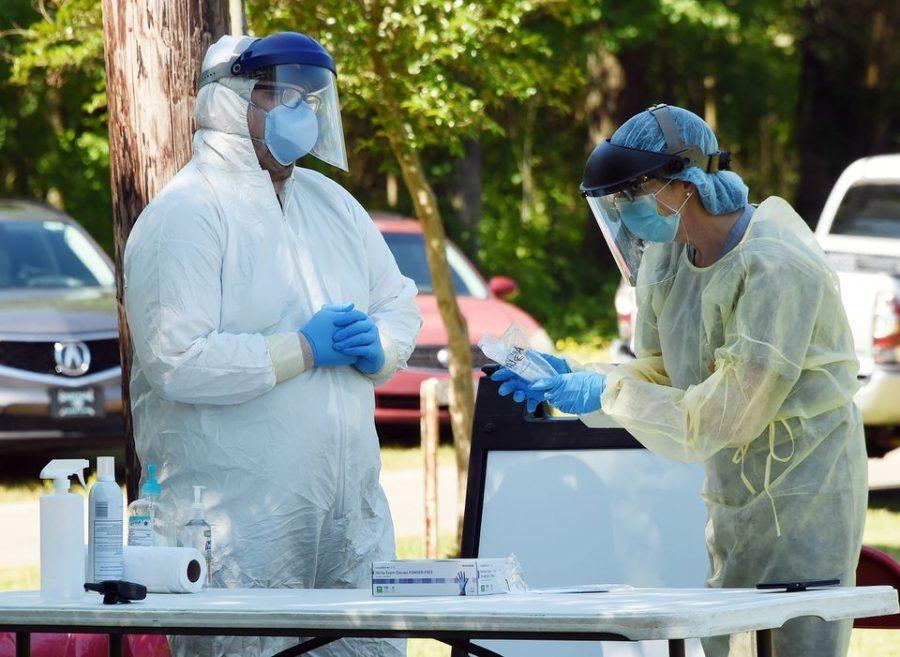As the scientists whose labs developed the [University of Arizona] antibody test for exposure to SARS-CoV-2, the virus that causes COVID-19, we read with interest the opinion piece by Andrea Moreno last week in the Daily Wildcat (OPINION: Why the COVID-19 Antibody Test is Useless on Campus). We would like to offer our thoughts on exactly how the test is useful on campus.
After any acute viral infection, an immune response is generated and persists for some amount of time — SARS-CoV-2 immunity is likely to persist for at least 6 months. As a reference, infections by the first SARS-CoV-1 led to immunity that can still be detected 17 years later. The most easily measured surrogates of this response are antibodies that circulate in the blood. The test developed at [the UA] measures antibodies that bind to two different parts of the SARS-CoV-2 virus. These antibodies develop and are consistently detectable about 2 weeks after symptom onset. In this regard, Moreno is correct that antibody tests are not at all useful for detecting active infections.
What they are useful for is detecting cumulative incidence in a community or campus. The tests to detect active infections have a relatively short time window in which they can be used. If a certain group of people or community was infected but not tested within this timeframe, these cases could still be detected later by antibody tests. Knowing cumulative infections is important for designing mitigation strategies. For example, a recent antibody study in Spain found wide variations in exposure rates in different regions. These studies thereby instruct where interventions should be focused and how well current efforts are working.
The question then arises as to why an individual would volunteer to take the test, and whether antibodies indicate some degree of immunity. Moreno quoted a statement from several months ago from the World Health Organization, “There is currently no evidence that people who have recovered from COVID-19 and have antibodies are protected from a second infection.” Yet the WHO corrected this just hours after the first statement to, “We expect that most people who are infected with #COVID19 will develop an antibody response that will provide some level of protection.” This latter statement is far more accurate and consistent with the available data on this virus and with decades of knowledge acquired in viral immunology. There have been some recent reports in which people who had recovered were infected a second time. However, this is exceedingly rare. To date, of nearly 30 million infections worldwide, there have been less than ten confirmed cases of re-infections. It is possible to get re-infected, but it is certainly not likely.
A related issue is whether the test is sufficiently accurate to detect SARS-CoV-2-specific antibodies. Moreno raised the possibility that the test does not distinguish between common cold-causing coronavirus and SARS-CoV-2 exposures. The percentage of people who have antibodies against common coronaviruses is well over 90%. We therefore tested hundreds of samples obtained prior to 2020 and found that none of them would have been called positive by our criteria. We then performed a pilot study of 6,000 participants in Pima County. Our test detected 61 positive samples of which 60 possessed neutralizing antibodies, which prevent the virus from infecting cells. By these criteria, the rate of false positives for the UA test is less than 1 in 5,000. Because of its accuracy, the [University of Arizona] antibody test received emergency use authorization from the [U.S. Food and Drug Administration] several weeks ago.
Finally, Moreno raised the concern that resources used for the antibody test would be best diverted elsewhere. Yet the antibody tests are financed by a $3.5 million contract with the State of Arizona. These expenses do not come from the university’s operating budget and the funds cannot be used for other purposes.
In summary, we hope that students, faculty and staff participate in this valuable research program and epidemiological tool.
Follow The Daily Wildcat on Twitter









